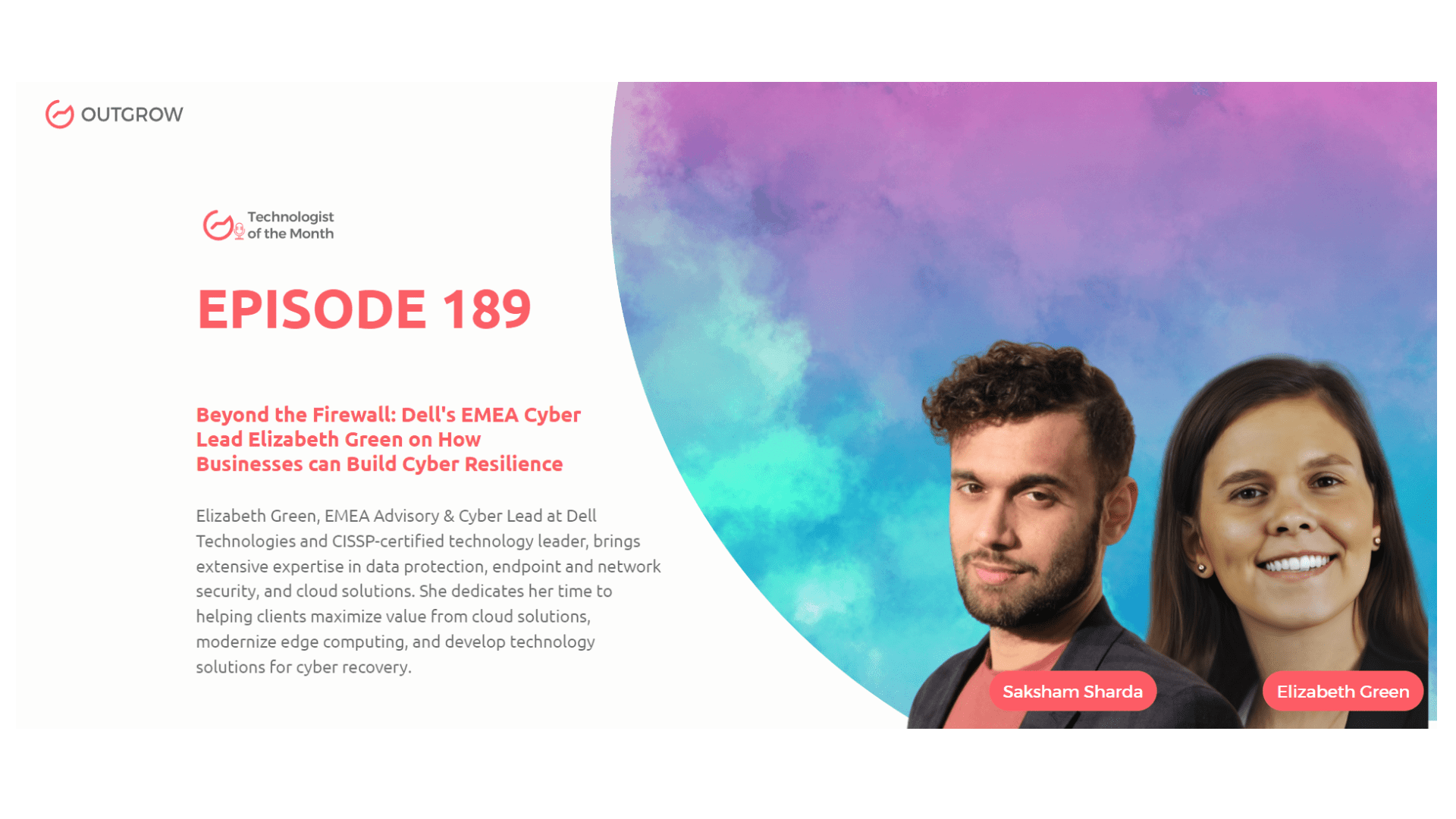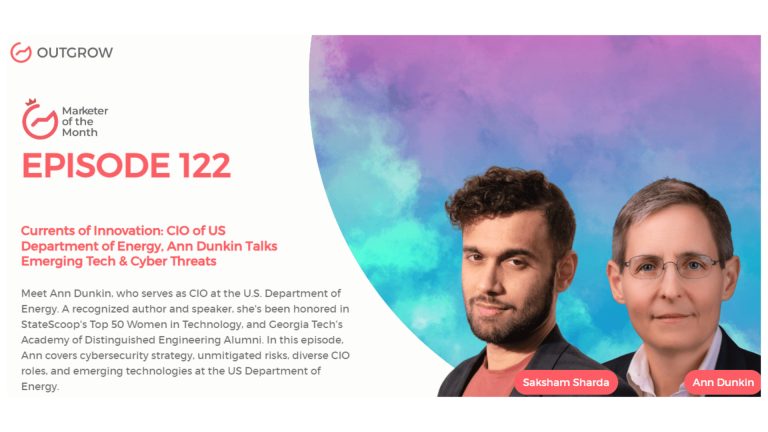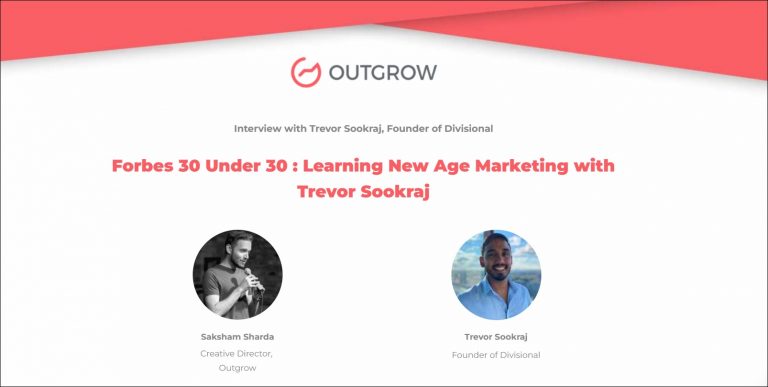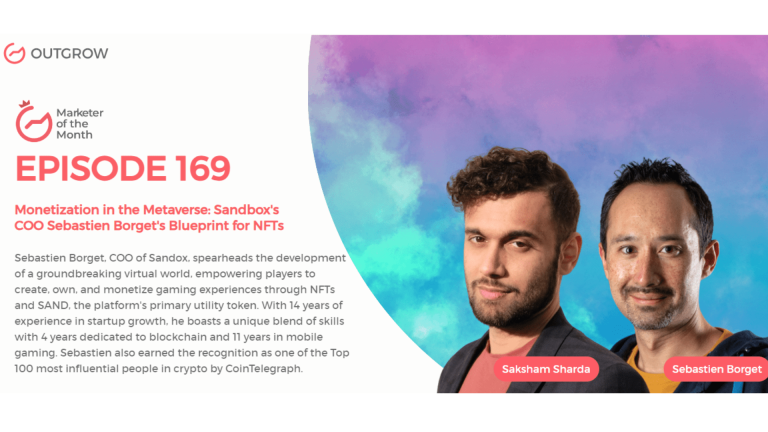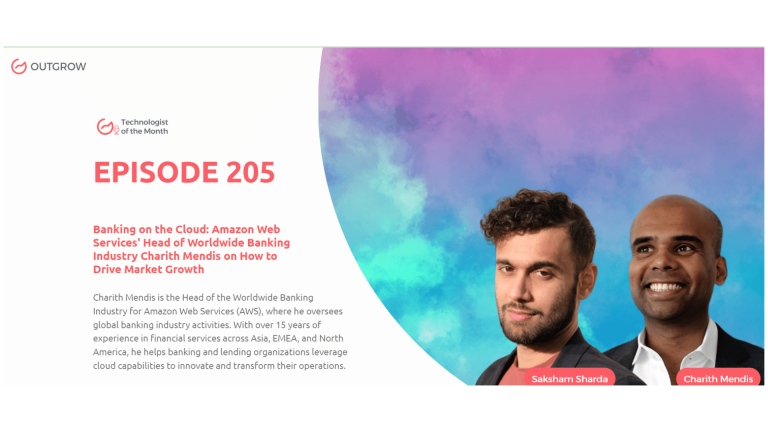EPISODE 189: Marketer of the Month Podcast with Elizabeth Green
Table of Contents
Hey there! Welcome to the Marketer Of The Month blog!
We recently interviewed Elizabeth Green for our monthly podcast – ‘Marketer of the Month’! We had some amazing insightful conversations with Elizabeth and here’s what we discussed about –
1. Advising clients on enhancing cyber resilience through strategic partnerships.
2. Emphasizing diverse teams and setting clear goals with actionable plans for inclusivity.
3. Embracing the “never trust, always verify” principle, ensuring resilient cybersecurity solutions.
4. Prioritizing business continuity and recovery plans amidst inevitable cyber threats.
5. Preserving stakeholder confidence and ensuring consumer services amidst cyber threats.
6. Addressing data privacy and security concerns, while acknowledging AI’s potential benefits.
About our host:
Dr. Saksham Sharda is the Chief Information Officer at Outgrow.co. He specializes in data collection, analysis, filtering, and transfer by means of widgets and applets. Interactive, cultural, and trending widgets designed by him have been featured on TrendHunter, Alibaba, ProductHunt, New York Marketing Association, FactoryBerlin, Digimarcon Silicon Valley, and at The European Affiliate Summit.
About our guest:
Elizabeth Green, EMEA Advisory & Cyber Lead at Dell Technologies and CISSP-certified technology leader, brings extensive expertise in data protection, endpoint and network security, and cloud solutions. She dedicates her time to helping clients maximize value from cloud solutions, modernize edge computing, and develop technology solutions for cyber recovery.
Beyond the Firewall: Dell’s EMEA Cyber Lead Elizabeth Green on How Businesses Can Build Cyber Resilience
The Intro!
Saksham Sharda: Hi, everyone. Welcome to another episode of Outgrow’s Marketer of the Month. I’m your host, Dr. Saksham Sharda, and I’m the creative director at Outgrow. co. And for this month we are going to interview Elizabeth Green, who is the EMEA Advisory & Cyber Lead at Dell Technologies.
Elizabeth Green: Great to be here. Thank you.
Don’t have time to read? No problem, just watch the Podcast!
Or you can just listen to it on Spotify!
The Rapid Fire Round!
Saksham Sharda: Alright, so let’s start with the first one, the rapid-fire round. At what age do you want to retire?
Elizabeth Green: 50.
Saksham Sharda: How long does it take you to get ready in the mornings?
Elizabeth Green: 10 minutes. Very fast.
Saksham Sharda: Favorite color?
Elizabeth Green: Red.
Saksham Sharda: What time of day are you most inspired?
Elizabeth Green: Morning.
Saksham Sharda: How many hours of sleep can you survive on?
Elizabeth Green: Five.
Saksham Sharda: Fill in the blank. An upcoming technology trend is _____.
Elizabeth Green: Exciting.
Saksham Sharda: The city in which the best kiss of your life happened.
Elizabeth Green: Rome.
Saksham Sharda: How do you relax?
Elizabeth Green: I take a nice bath.
Saksham Sharda: How many cups of coffee do you drink per day?
Elizabeth Green: Don’t tell my doctor. But four, five.
Saksham Sharda: A habit of yours that you hate.
Elizabeth Green: Looking at sent emails too many times.
Saksham Sharda: The most valuable skill you’ve learned in life.
Elizabeth Green: If you’re on time, you’re late.
Saksham Sharda: Your favorite Netflix show.
Elizabeth Green: Emily In Paris.
Saksham Sharda: One-word description of your leadership style.
Elizabeth Green: Collaborative.
Saksham Sharda: Top priority in your daily schedule.
Elizabeth Green: Working out.
Saksham Sharda: Ideal vacation spot for relaxation.
Elizabeth Green: Lake Michigan.
Saksham Sharda: Key factor for maintaining a work-life balance.
Elizabeth Green: Maintaining perspective work is not your life.
The Big Questions!
Saksham Sharda: Well that’s the end of the rapid fire. We can move on to the longer questions now. The first one is, can you share insights into your role as the EMEA advisory and cyber lead at Dell Technologies? What are the key challenges you address in helping organizations enhance their cyber resilience through strategic technology partnerships?
Elizabeth Green: Yeah. So I spend time with Dell’s blue chip clients, helping them build greater levels of cyber resilience. What that means is working with clients, looking at some of their large risks, and helping them develop strategies to overcome, some of the gaps they might have in terms of how they would best respond and recover in the event of a catastrophic cyber attack. So that can look like identifying key services, understanding how they’re being protected, how the data that’s behind it’s being protected, and then how that would be recovered and the event something happens.
Saksham Sharda: And how often does it happen?
Elizabeth Green: Cybercrime happens all the time at different scales and different impacts. So, it’s something that every business needs to be prepared for.
Saksham Sharda: So in your advocacy for diversity and inclusion, particularly in empowering women to enter the cybersecurity and technology field, what initiatives or strategies do you find most effective in driving positive change?
Elizabeth Green: It’s a huge area of concern for me. I think there needs to be much more diversity and much more talent in general in this field of cybersecurity. I think someone much smarter than me once said, if you can’t see it, you can’t be it. So I think the first thing is we need to promote and make sure that we are keeping female talent within the business and giving them all the tools to be successful and moving them up into leadership roles because it’s not gonna be attractive for women to join a male-dominated profession. So that’s one thing that we need to upskill. We need to reskill and create a diverse culture within those fields.
Saksham Sharda: And what are some of the steps that organizations are already taking in this regard?
Elizabeth Green: I think we’re seeing a great focus on having a truly diverse team. Make sure we’re not making software, we’re not making technology decisions without a well-balanced team. That’s not just necessarily gender, but creed and race. And I think that’s important. I think having goals and objectives for companies is important. I think what needs to be followed up is how we’re gonna get there. It’s one thing to have a great vision. You know, we want to see 50% of women in leadership goals. There needs to be a solid plan to move. And I think that’s what I’m not seeing enough of. Lots of great lip service, but not enough facts.
Saksham Sharda: So you’ve spoken about cybersecurity and diversity and you’ve also been shortlisted for the Cyber Woman of the Year at the 2023 Cybersecurity Awards. What motivates you to champion cyber resilience and what advice would you give to those aspiring to make a significant impact in this domain?
Elizabeth Green: What inspires me is I see amazing women that I look up to in the field of cybersecurity that are championing diversity that, you know, want me to succeed, want other women to succeed. So I think, you know, one thing that you can do is find a woman like that or be a woman like that to someone else. If you’re finding success in this field, there’s probably someone else you can champion along the way. I think for women, a lot of times, you know, we’re discounted at the beginning. So for me, getting the CISO certification helped me feel like I was fully entitled to be in the room and part of the conversation. So I think for my confidence is important and I would encourage other women to do it. Get it. It will probably take a year. Go for it. So I think those are some ideas.
Saksham Sharda: Could you speak a bit about Dell’s Zero Trust strategy, what are the key elements of the strategy when it comes to cyber resilience and how does it contribute to building a more resilient community and organization?
Elizabeth Green: Sure. Zero Trust is great in this idea of never trust, always verify. It’s not necessarily something that only Dell does. We’re seeing it, you know, everywhere and all organizations are building a zero-trust framework. Dell is a part of that complete system. So we not only are building Zero Trust into our solutions, we’re building Zero Trust solutions that you can buy. We’re also working with an ecosystem of other partners to do it. I think what’s quite interesting is, this project for Zero based in the US where we’ve signed up to take on the DOD list of criteria for what a zero trust solution needs to look like, we’re then gonna be validated against that and once approved we’ll have DOD approved zero trust solution. So a client wants to buy full end-to-end capability and solution. Again, they can buy it from Dell knowing it’s verified by the department, the DOS. So I think that’s great.
Saksham Sharda: Would you recommend other companies to do the same with the DOD?
Elizabeth Green: Yeah. It doesn’t have to just be the DOD. I think that certifications, again, like working with the DOD help because a client that’s buying it knows that, you know, someone else has looked into this. but I think what we need in general is more collaboration with the public and private sectors. So that might look different in Europe and the UK, might look different in Asia, but I think having, you know, government involvement in technology, having technology providers like Dell to help, the public sector to be more resilient. I think that’s great.
Saksham Sharda: In your recent episode on SiliconANGLE and the CUBE, you mentioned cyber resilience. What is it about? Can you tell us?
Elizabeth Green: Yeah. I do so many of these so I’ll have to remember exactly what I said in that episode. But I think for me cyber resilience is not about building the most secure business that no one can penetrate. It’s about assuming no matter what you do, someone will get into the environment, what is your plan to recover? Now I think we’ve moved from that being a very technology-focused plan to being a business focused. There’s no sense in having recoverable infrastructure if business is not recoverable. So I think one of the things I work with our clients on is understanding the business priorities, what those key services are that you would fail to be a bank without an energy company, and then making sure we’re taking the right steps, to protect and recover that service. And underneath that, there will be technology and data, there will be investment in technology solutions, but it’s much more about the business and the priorities of the business.
Saksham Sharda: Do you have any memorable example of this business focus that was unique to a client in a different industry?
Elizabeth Green: Yeah, so I spent a lot of time in financial services and I think their focus, you know, is two parts. One is preserving stake, but also making sure that customers can do things like take money outta the ATM and apply for a loan. So the work that Dell’s been doing, with Altered Thar, which is a US not-for-profit that was started by the largest banks to protect consumer confidence in the financial system is unique. I think what’s unique about it is looking at the consumer lens. I go to the bank and all of a sudden they say, we have no idea how much money’s in your bank account lines we’re sorry, we might know tomorrow. What kind of panic does that give me personally? What does that give the global economy? That is a huge problem. So I think, working with financial services to make sure that those systems and services are protected, working with a group like Sheltered Harbour that’s looking out for those consumers is amazing work, and important because it can have global implications.
Saksham Sharda: So you’re also an advocate for the use of AI in the workplace. How have you personally leveraged AI tools to enhance your productivity and decision-making?
Elizabeth Green: Yeah, AI is great. I think I’m on a panel tomorrow on generative AI and security, and we’re excited to talk and explore the good and the bad of generative AI. In terms of the good and how I’m using it, I think we sometimes can be quite emotive at work. There might be some really difficult conversations that we have to have or notes that we’re, we’re writing to take the emotion out. Oftentimes I’ll put it all in AI and say, can you make this more corporate, less emotive? And I think it’s really helpful because it’s getting my point across, but it’s doing it in a more balanced way, but I don’t feel like I have the energy maybe because of the person I’m sending them to. As such, I think what we are learning about generative AI is you have to agree with what it produces. And it doesn’t always produce the things we see hallucinations in errors all the time. So I would say you have to use it with caution and intellect, but it can be a great tool.
Saksham Sharda: And are there any cybersecurity issues of companies using just Chat GPT?
Elizabeth Green: Tons. That’s what we’ll be talking about tomorrow. Okay. I guess, you know, we’re worried about disclosure of data, you know, the privacy of data, how to genie’s outta the bottle, so how do we manage this? And then I think we’re also worried about what bad actors are doing on the other side. They’re taking advantage of this and they’re using it for disinformation, misinformation, and DeepFakes and just being able to have much more scale with the criminal activities that they perform. So it’s a real risk, but I think there’s also a real benefit in how to harness the positive elements of generative AI and use it to our benefit.
Saksham Sharda: So let’s switch to a lighter note. What does your typical day at Dell look like? You wake up in the morning and then?
Elizabeth Green: Wake up in the morning, have my coffee, and then rush into the office. Maybe meet a few clients, and work with a lot of different strategic partners, like a center for example, where you might talk about how we can both help a client build a greater level of cyber resilience. We let them go meet the client together. I might do some sort of panel. I might mentor a younger woman who’s looking into, cybersecurity or is in the middle of taking the CISSP, and encourage her. I might go get encouragement from someone who’s helping me and mentoring me. These are certain things.
Saksham Sharda: So could you talk a bit about your role as the EMEA advisory and cyber lead at Dell? You work closely with CISOs, CTOs, CIOs, and heads of risk. What are the most common cybersecurity challenges that organizations in the EMEA region are currently facing?
Elizabeth Green: So challenges are, you know, how do we handle regulatory pressures? There’s a lot of pressure with the Bank of England that I think is helpful and good because I think they drive decision-making, but also I think our real concerns for organizations that have lots of priorities, so that’s one. I think another is, you know, the nature of the silos within a business. So because we’re seeing this as more of a business decision, we still have security and IT and legal all kind of in these bubbles. And what we realize is as we build zero trust in, as we build resilience in, we need to collapse those into one and have much more of a flat organization where we can talk to each other. So I think that is a real challenge for organizations. How do we reduce risks when we don’t even know about some of these risks? and then emerging technologies generated AI already mentioned, but I think super exciting, but how are we gonna manage this? How are we gonna deploy it and how are we gonna deploy it in a way that’s responsible and secure?
Saksham Sharda: So what’s your strategy for dealing with European regulations because they’re different for different countries?
Elizabeth Green: Yeah, I think it depends on the sector. I think financial services is pretty clear as to what needs to be done. It’s just a matter of doing it and prioritizing certain elements. I think I’m encouraged by what I’ve seen from the European AI Act in terms of doing fencing, you know, certain types of AI that are allowed, not allowed, and making sure that organizations are responsible with how they use the technology. So I think you have to take it client by client. Some very interesting regulations in Switzerland are different, you know, than the UK for example. So, take it as it comes.
Saksham Sharda: Alright, so the last question for you is of a personal kind. Yeah. What would you be doing in your life, if not this?
Elizabeth Green: I would say I love to travel, so I might be a travel blogger with some sort of show on the side, not ordained because I’m not as cool as him, but something like that. Tasting different foods, meeting different people, and different backgrounds, and writing about what I see.
Let’s Conclude!
Saksham Sharda: Thanks, everyone for joining us for this month’s episode of Outgrow’s Marketer of the Month. That was Elizabeth Green, who is the EMEA Advisory & Cyber Lead at Dell Technologies.
Elizabeth Green: Pleasure. Thanks for having me.
Saksham Sharda: Check out the website for more details and we’ll see you once again next month with another marketer of the month.

Muskan is a Marketing Analyst at Outgrow. She is working on multiple areas of marketing. On her days off though, she loves exploring new cafes, drinking coffee, and catching up with friends.

